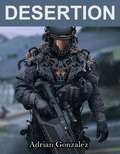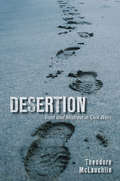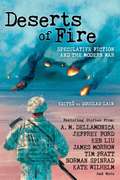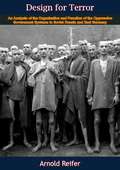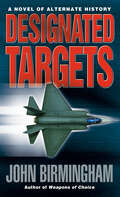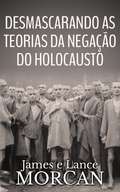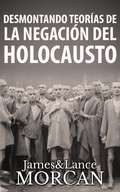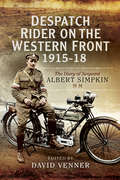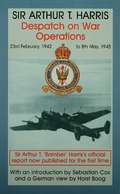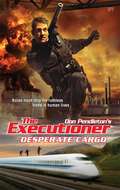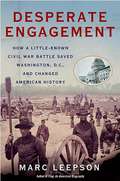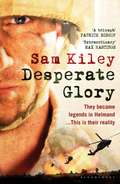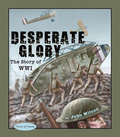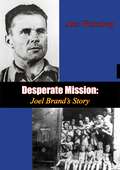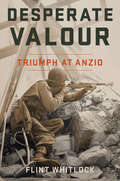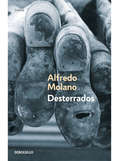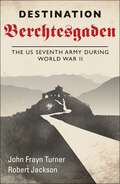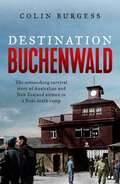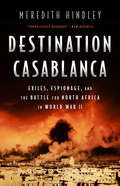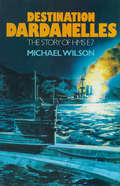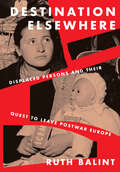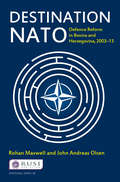- Table View
- List View
Desertion: Humanitarian Redemption
by Adrián GonzalezA rookie is promoted after performing a great feat by eliminating an alien nest. Ovated by all his teammates after receiving the medal of honor, he is transferred to the special team. His mission, the destiny of humanity. In a last attack forced by the allies to finally finish with the Tungs. But what would become of us if everything they tell us is a lie. To discover the truth in a war. To have in the hands the absolute truth written by an enemy. Could you decide who is the good and who is the evil? We all make decisions, the young legend should make only one, as a result of the extinction of the human race.
Desertion: Trust and Mistrust in Civil Wars
by Theodore McLauchlinTheodore McLauchlin's Desertion examines the personal and political factors behind soldiers' choices to stay in their unit or abandon their cause. He explores what might spur widespread desertion in a given group, how some armed groups manage to keep their soldiers fighting over long periods, and how committed soldiers are to their causes and their comrades.To answer these questions, McLauchlin focuses on combatants in military units during the Spanish Civil War. He pushes against the preconception that individual soldiers' motivations are either personal or political, either selfish or ideological. Instead, he draws together the personal and the political, showing how soldiers come to trust each other—or not. Desertion demonstrates how the armed groups that hold together and survive are those that foster interpersonal connections, allowing soldiers the opportunity to prove their commitment to the fight.McLauchlin argues that trust keeps soldiers in the fray, mistrust pushes them to leave, and political beliefs and military practices shape both. Desertion brings the reader into the world of soldiers and rigorously tests the factors underlying desertion. It asks, honestly and without judgment, what would you do in an army in a civil war? Would you stand and fight? Would you try to run away? And what if you found yourself fighting for a cause you no longer believe in or never did in the first place?
Deserts of Fire: Speculative Fiction and the Modern War
by Kate Wilhelm Norman Spinrad James Morrow Jeffrey Ford Tim Pratt A. M. Dellamonica Ken Liu Douglas LainSpeculative fiction stories that explore the ambiguities of war—from award-winning, bestselling authors Jeffrey Ford, Ken Liu, Kate Wilhelm, and others. In the tradition of In the Field of Fire, a collection of stories with a Vietnam War theme, Deserts of Fire is a war-inspired anthology for the new millennium. For many, the recent wars in the deserts of Iraq, Afghanistan, and the Middle East are just as slippery to grasp and difficult to understand as Vietnam was two generations earlier. Inside Deserts of Fire are stories from a variety of bestselling and award-winning authors that start with the simple and modest ambition of making the reader feel strange about the recent past. Because when there are too many explanations, the truth won’t be found by merely choosing one side or the other. But rather, the truth is in the existence of the confusion itself.
Design for Terror: An Analysis of the Organization and Function of the Oppressive Government Systems in Soviet Russia and Nazi Germany
by Arnold ReiferTHE TITLE OF this study unfortunately implies much and tells little. The scope of any work such as this must of necessity be limited to certain aspects only of the regimes in question. The formation and political history of the Nazi and Soviet regimes, for example, have been covered only in the most cursory manner, and only insofar as they bore a direct relationship to the network of terror which evolved in both states.The historical period herein covered is approximately 1932 to 1941 for Germany and 1918 to 1958 for Soviet Russia. Emphasis has been placed on the Soviet model, which is the more contemporary of the two. The history, scope and function of the Nazi secret police will, however, be discussed where it can be shown that a similarity or a contrast existed with respect to the organs of repression in Russia.In addition to a discussion of the terror itself, mention will also be made of the background, methods, goals and actual operations of the instruments of terror. I have tried, to the best of my ability, to preserve the continuity throughout the text and to avoid “skipping” from the Gestapo in one paragraph to the N.K.V.D. in the other. A conscious attempt has been made not only to examine the system of terror in and for itself but also to discover the significance of terror in the daily life of the average citizen as well as to ascertain to what extent terror represents an inevitable feature of totalitarian societies.”—Arnold Reifer
Designated Targets: A Novel of the Axis of Time (Axis of Time #2)
by John BirminghamThe Second World War was turned on its head at the moment Admiral Kolhammer’s ultra-modern stealth warships were hurled back through time from 2021. But no one could have predicted just how much of a nightmare would ensue . . . Only months after the Transition, the great powers scramble to develop the weapons of tomorrow. The year 1942 is now a world of crude jet fighters, monstrous attack helicopters, and unholy dirty bombs - a mongrel technology, born decades prematurely. Then, in a radical rewriting of history, Japanese forces sweep into Australia , foreign agents begin a campaign of terror in the USA , and Germany prepares for an all-out attack on Britain . The twenty-first-century forces must resort to the most extreme measures yet and face a future rife with possibilities - all of them apocalyptic . . . Picking up from where he left off with Weapons of Choice, John Birmingham shocks and awes us with this gripping second instalment in the Axis of Time trilogy.
Desire Denied
by Layne MacadamWhen gemologist Beth Carmichael landed a plum assignment in Columbia, she was thrilled her best friend Loretta opted to tag along. That is until Loretta is kidnapped. To rescue her, Beth must confront more than one demon, not least of which is Loretta's brother, former SEAL and nemesis Zach Buchanan. Action, adventure, and burning passion, Desire Denied has it all. Romance author Layne Macadam presents Book 2 of her hot, contemporary series Desire. You won't be able to put this one down!Ex-SEAL Zach Buchanan can sum Beth Carmichael up in two words--trouble magnet. Ever since his sister Loretta befriended her, she's been in and out of trouble, and Beth a constant thorn in his side. For five years and a multitude of reasons, he's fought his feelings by avoiding her, but when she telephones out of the blue with news she's in Columbia and Loretta has been abducted, he is forced to confront her again, along with his demons. To rescue Loretta, they must put aside their history and start afresh because the ransom terms are specific. Beth must make the delivery. Simple enough until things turn sour and they are forced on a journey through thick jungle and mountainous terrain. Thrown together, Zach's eyes are opened and he learns some truths about himself--could he have misjudged Beth all these years?Content Notes: Hot, Non-Sexual Graphic Violence, Non-Sexual Physical Assault, Contemporary, Suspense, Action, Adventure, Uniformed Heroes
Desire Unleashed
by Layne MacadamFind out what happens when a career-driven, cocky Navy SEAL meets an old-fashioned good girl looking for love in all the wrong places. Intrigue, kidnapping, and danger await you in Layne Macadam's explosive tale of desire unleashed.When schoolteacher Kathy Bellamy moved from Louisiana to Coronado, she didn't expect her secret dream, or her worst nightmare, to become a reality.Confirmed bachelor and relationship cynic, Shane Jackson has no room in his life for a permanent woman. Temporary liaisons are all he is up for. Cocky and self-assured, he believes he can pick a like-minded player at a glance. So when he discovers Kathy is the complete antithesis of what he believed her to be, he is thrown into a tailspin. Before long, and way out of his comfort zone, he finds himself knee deep in a relationship he can't quite seem to end.Kathy longs for a fairytale romance, an old-fashioned girl saving herself for the right guy. But, after one date with Navy SEAL Shane Jackson, she trashes her values and willingly tumbles into the sack without a thought for the consequences. Now, Kathy's love life will soon become the catalyst of a nightmare. When she throws caution to the wind and acts out of character, her actions are seen as a betrayal by her stalker, a betrayal that demands retribution in blood. Abducted at knifepoint and taken to a secret location, it's up to Shane, the ultimate predator, to find and rescue her before it's too late!Content Notes: Contemporary, Uniformed Heroes, Sexy Spicy Romance, Physical or Non Sexual Assault
Desmascarando as Teorias da Negação do Holocausto
by Cassia Pereira James Morcan Lance MorcanDesmascarando as Teorias da Negação do Holocausto, por James Morcan e Lance Morcan com prefácio da sobrevivente do Holocausto, Hetty E. Verolme, visa acabar com o negacionismo de uma vez por todas ao abordar tal fenômeno absurdo. Escrito em estreita consulta com sobreviventes do Holocausto e historiadores da Segunda Guerra Mundial, aqui nenhuma pedra é poupada ao ser meticulosamente verificado os fatos históricos do genocídio. James e Lance Morcan apresentam uma vasta gama de fontes incluindo documentação nazista, relatos de testemunhas oculares, relatórios científicos e provas fotográficas chocantes para calar o debate que os negacionistas desejam criar. Um por um, dos vários argumentos que os negacionistas do Holocausto usam para tentar desacreditar os registros de guerra são cuidadosamente desmantelados e em seguida sistematicamente desmascarados. Entre as teorias a serem desmascaradas incluem: que o número de seis milhões de mortos é um exagero; extermínios câmaras de gás são fictícios; Adolf Hitler e o Terceiro Reich são indevidamente difamados; a análise de registros do Holocausto sendo um tabu devido a leis específicas na Europa que criminalizam os negacionistas; os "Sionistas do Mal" e Israel sendo tão poderosa, que eles podem censurar a história. O Holocausto é mostrado nas páginas deste livro como um dos mais bem documentados e historicamente mais comprovado crime do século XX. No processo, muitos dos mais famosos negacionistas do mundo, incluindo o desonrado historiador britânico David Irving e o ex-Presidente do Irã, Mahmoud Ahmadinejad, são revelados de serem nada mais do que antissemitas procurando denegrir, minar e desmoralizar a população judaica do mundo. Nesta esclarecedora leitura que cobre mais de dois milénios de história mundial, o antissemitismo é mostrado não apenas de ser a raiz de cada forma de negação do Holocausto, mas também a razão para a perseguição
Desmontando Teorías de la Negación del Holocausto
by Juliana Arango James Morcan Lance MorcanDescripción del Libro Desmontando Teorías de la Negación del Holocausto investigadores independientes y realizadores de cine James Morcan & Lance Morcan, con prefacio de la sobreviviente del Holocausto, Hetty E. Verolme (autora de The Children's House of Belsen), es una obra que pretende detener el Negacionismo de una vez por todas al hacerle frente al extraño fenómeno. Escrita con la colaboración de sobrevivientes del Holocausto y de historiadores de la Segunda Guerra Mundial, es una obra que no escatima detalles para análisis, de los hechos históricos del genocidio. Los Morcan presentan una gama amplia de fuentes, incluyendo documentación nazi, testimonios, informes científicos y evidencia fotográfica impresionante, con el fin de acabar con el debate que los negacionistas insisten en propiciar. Uno por uno, los variados argumentos que los negacionistas del Holocausto utilizan para tratar de desacreditar los registros de la guerra son examinados y luego, sistemáticamente desmentidos. Las teorías desmontadas incluyen: la cifra de seis millones de muertos puesta como una exageración; los exterminios en las cámaras de gas descritos como ficticios; Adolfo Hitler y el Tercer Reich mostrados como figuras inapropiadamente vilipendiadas; los análisis de los registros del Holocausto puestos como un tabú debido a leyes específicas en Europa que criminalizan a los negacionistas; “Sionistas malvados” y una Israel poderosa al punto de supuestamente poder manipular la historia. El Holocausto es mostrado en estas páginas como uno de los crímenes del Siglo 20 mejor documentados y comprobados desde el punto de vista forense e histórico. En el proceso, muchos de los negacionistas más infames del mundo, incluyendo al historiador británico David Irving y al antiguo presidente de Irán Mahmoud Ahmadinejad, son puestos en evidencia como nada más que antisemitas que pretenden denigrar, menoscabar y desmoralizar a la población judí
Despatch Rider on the Western Front, 1915–18: The Diary of Sergeant Albert Simpkin MM
by David VennerThe colorful eyewitness-to-history diary of a young man who loved motorcycles—and used these new machines to serve his country in the Great War. This is the skillfully abridged version of the diary of a First World War motorcycle despatch rider, Sergeant Albert Simpkin, who was attached to the HQ 37th Division. The diary entries, and some longer descriptions of the main actions of the Division, provide a fascinating record of the life of a despatch rider on the Western Front—one day dodging shell holes and ammunition limbers to take his despatches to the front, the next observing the quaint but often courageous lives of the local populace. Throughout the diary are colorful and amusing anecdotes about his fellow soldiers, and critical comments on the strategies and tactics employed by the officers. &“It is worth seeking out and reading and if you are a fan of Great War motorbikes and vehicles this is a must.&” —War History Online
Despatch on War Operations: 23rd February 1942 to 8th May 1945
by Air Chief HarrisThis is the first time that Sir Arthur Bomber' Harris's own papers covering his three and a half years at Bomber Command have been published and made available to the general public. The book also contains an introduction by Sebastian Cox, an Air Staff Memorandum written immediately after the war and a revisionist German viewpoint by Horst Boog. It
Desperate Cargo (Executioner #377)
by Don Pendleton Mike LinakerHUNTING GROUND. Infiltrating a Dutch human trafficking organization turns deadly when two undercover agents are tortured and shot. Protected by a complex infrastructure and ruthless lawyers, the businessmen behind the crime are untouchable under international law. But Mack Bolan isn't about to play by their rules. Entering Holland alone, Bolan heads to Rotterdam where he is prepared to seek out his target and destroy the corrupt organization piece by piece. The leaders of the group think they are invincible, but with the lives of women and children at stake, they are about to learn what it's like to be hunted by the Executioner.
Desperate Engagement: How a Little-known Civil War Battle Saved Washington, D.C., and Changed American History
by Marc LeepsonThe July 9, 1864, Battle of Monocacy is one of the Civil War's most significant, yet little-known, battles. What played out that day in the corn and wheat fields near Frederick, Maryland, was a full-field engagement between 12,000 battle-hardened Confederate troops led by the controversial Jubal Early, and 5,800 Union troops, many of them untested in battle, under the mercurial Lew Wallace, best known as the author of Ben Hur. When the fighting ended, some 1,300 Union troops were dead, wounded, or captured, and Early- who suffered some 800 casualties- had won the northernmost Confederate victory of the war. Two days later, Early sat astride his horse outside the gates of Fort Stevens in the upper northwestern fringe of Washington, D.C. He was about to make one of the war's most fateful decisions: whether or not to invade the under-defended nation's capital. There was near panic in the streets when Washington learned of the impending Rebel attack. But Jubal Early did not pull the trigger, giving General Ulysses S. Grant just enough time to bring thousands of veteran troops up from Richmond. Historian Marc Leepson uses memoirs, diaries, and other primary sources in a reader-friendly and engaging retelling of the events surrounding what became known as "the Battle that Saved Washington," its impact on the last nine months of the Civil War, and on the course of American history.
Desperate Glory: At War in Helmand with Britain's 16 Air Assault Brigade
by Sam KileyIn the dust and blazing heat of Helmand, the young men of 16 Air Assault Brigade find themselves in the most relentless battles faced by British troops in recent history. As the only writer to have obtained unprecedented, unrestricted access to the front line, Sam Kiley is with them to bear witness to the most intense challenges of their lives. It is an unflinching portrait of the reality of war-the bombs, the shooting and the daily struggles that push them to the very limit of human endurance.
Desperate Glory: The Story of WWI
by John WilsonShort-listed for the 2009 Red Maple Award for Non-Fiction, OLA Forest of Reading and commended for the 2009 OLA Best Bets This book presents the story and issues of the First World War in a clear, concise and objective manner, accompanied on every page by photographs, original sketches or maps. Focussing on social as well as political issues with a Canadian perspective, Wilson presents the issues of the war with depth and compassion. This book will be a very useful tool for educators in explaining the hows and whys of this most important period.
Desperate Mission: Joel Brand’s Story
by Constantine Fitzgibbon Alex WeissbergThis book is the story of the former Hungarian Zionist leader, Joel Brand, as told to Alex Weissberg, author of The Accused, which told of his experiences as a prisoner of the Soviet secret police.Most of Desperate Mission: Joel Brand’s Story (1958) is devoted to an account of how Brand came to be in a position to negotiate with the Nazis for the lives of a million human beings and what he did to carry out his incredible mission.Written with all the passion of a man who was entrusted with an almost hopeless mission and had to sit by impotently watching the horrible consequences of its failure, Brand believed that goods and promises which would not have prolonged the fighting ability of the Wehrmacht by a single day might have prevented the slaughter of the 400,000 Jews from Hungary and the untold number from other countries who were put to death in the last year of Hitler’s regime.
Desperate Valour: Triumph at Anzio
by Flint WhitlockA riveting and comprehensive account of the Battle of Anzio and the Alamo-like stand of American and British troops that turned certain defeat into victoryThe four-month-long 1944 battle on Italy's coast, south of Rome, was one of World War II's longest and bloodiest battles. Surrounded by Nazi Germany's most fanatical troops, American and British amphibious forces endured relentless mortar and artillery barrages, aerial bombardments, and human-wave attacks by infantry with panzers. Through it all, despite tremendous casualties, the Yanks and Tommies stood side by side, fighting with, as Winston Churchill said, "desperate valour."So intense and heroic was the fighting that British soldiers were awarded two Victoria Crosses, while American soldiers received twenty-six Medals of Honor--ten of them awarded posthumously.The unprecedented defensive stand ended with the Allies breaking out of their besieged beachhead and finally reaching their goal: Rome. They had truly snatched victory from the jaws of defeat.Award-winning author and military historian Flint Whitlock uses official records, memoirs, diaries, letters, and interviews with participants to capture the desperate nature of the fighting and create a comprehensive account of the unrelenting slugfest at Anzio.Desperate Valour is a stirring chronicle of courage beyond measure.
Después de las Sombras (Crónicas de Contacto #3)
by Louis Edward RosasNadie pensó que regresarían, pero alguien lo ha hecho en la sorprendente conclusión de Las Crónicas de Contacto de Planeta Robot Planet y Contacto en la Cruz de Fuego. Después de las Sombras reúne al Dr. Wayne Parsons y su pequeño equipo JPL de la NASA mientras se esfuerzan por resolver asuntos de desplazamiento del espacio/tiempo y evidencia de actividades extraterrestres en la Tierra y en Marte que han puesto en riesgo sus vidas. Con el inminente lanzamiento de la primera misión tripulada a Marte, los Servicios Clandestinos y los siniestros Hombres de Negro acompañan al equipo del Dr. Parson en su carrera para descubrir la verdad antes de que el Hombre ponga un pie en el Planeta Rojo
Desterrados
by Bravo Alfredo Molano«Cuando mataron a Jaime Garzón admití que no podía regresar pronto, conseguí una mesa de trabajo grande, alé la pluma y comencé a escribir este libro. Al terminarlo comprendí agachando la cabeza en señal de profundo respeto que el drama de mi exilio, a pesar de sus dolores, es un pálido reflejo de la auténtica tragedia que viven a diario millones de colombianos desterrados, exiliados en su propio país. Creo, con ellos, que sólo un acuerdo político profundo permitirá echar las bases de una verdadera democracia; la guerra no tendría resultado distinto a la dictadura de los vencedores».Alfredo Molano
Destination Berchtesgaden
by Robert Jackson John FraynOf the US Armies fighting in Europe at the end of World War II, General Patch's Seventh Army has received the least attention from historians. Although over-shadowed by the performance of General Patton and the actions of his US Third Army (breaking out of the Normandy bridgehead, liberating Paris and seizing Remagen bridge), the Seventh Army made a considerable contribution to the Allied victory, particularly their rapid advance through southern Germany and Austria. The Seventh Army landed in Sicily in 1943, and then took part in Operation Anvil in 1944 before advancing across the Rhine and reaching Berchtesgaden itself. Both the successes and setbacks of the Seventh Army are discussed in this volume, as well as discussing the tactical victories and defeats that contributed to the Allied campaign.
Destination Buchenwald: The astonishing survival story of Australian and New Zealand airmen in a Nazi death camp
by Colin BurgessThe harrowing story of the Allied airmen who experienced the true horrors of Nazism firsthand. It was the summer of 1944 as liberating Allied forces surged towards Paris following the D-Day landings. For a large group of downed airmen being held in that city&’s infamous Fresnes Prison, they were about to face evacuation into the blackest, bloody heart of Germany and experience the most acute evil of the war. Amid great secrecy, those 168 airmen – including several from Australia and New Zealand – were transported on a filthy, overcrowded nightmare train journey which ended at the notorious Buchenwald concentration camp, accompanied by orders for their execution. At Buchenwald they witnessed extreme depravity that would haunt them to the end of their days. Yet, on returning home, they were confronted by decades of denials from their own governments that they had ever been held in one of Hitler&’s most vile concentration camps. In conducting his original deep research for this book – now completely expanded and updated – Colin Burgess personally interviewed or corresponded with dozens of the surviving airmen from a number of nations, including their valorous leader, New Zealand Squadron Leader Phil Lamason. Destination Buchenwald tells a compelling story of extraordinary bravery, comradeship and endurance, when a group of otherwise ordinary servicemen were thrust into an unimaginable Nazi hell. 'This was the first book to provide an insight into our experiences as a group of captured allied airmen, betrayed to the Gestapo, tortured and deported to Buchenwald concentration camp. I consider it to be one of the best interpretations of the events as it reflects the voices of the survivors and their challenges to stay alive in such dehumanising circumstances.' Sqn Ldr Stanley Booker, RAF (Rtd.), MBE, Légion D'Honneur: Last surviving member of the Buchenwald airmen
Destination Casablanca: Exile, Espionage, and the Battle for North Africa in World War II
by Meredith HindleyIn November 1942, as a part of Operation Torch, 33,000 American soldiers sailed undetected across the Atlantic and stormed the beaches of French Morocco. Seventy-four hours later, the Americans controlled the country and one of the most valuable wartime ports: Casablanca.In the years preceding, Casablanca had evolved from an exotic travel destination to a key military target after France's surrender to Germany. Jewish refugees from Europe poured in, hoping to obtain visas and passage to the United States and beyond. Nazi agents and collaborators infiltrated the city in search of power and loyalty. The resistance was not far behind, as shopkeepers, celebrities, former French Foreign Legionnaires, and disgruntled bureaucrats formed a network of Allied spies. But once in American hands, Casablanca became a crucial logistical hub in the fight against Germany--and the site of Roosevelt and Churchill's demand for "unconditional surrender."Rife with rogue soldiers, power grabs, and diplomatic intrigue, Destination Casablanca is the riveting and untold story of this glamorous city--memorialized in the classic film that was rush-released in 1942 to capitalize on the drama that was unfolding in North Africa at the heart of World War II.
Destination Dardanelles: The Story of HMS E7
by Michael WilsonWhen the First World War started in 1914 the potential of the submarine as a tactical weapon was largely a matter of conjecture.
Destination Elsewhere: Displaced Persons and Their Quest to Leave Postwar Europe
by Ruth BalintIn this unique "history from below," Destination Elsewhere chronicles encounters between displaced persons in Europe and the Allied agencies who were tasked with caring for them after the Second World War. The struggle to define who was a displaced person and who was not was a subject of intense debate and deliberation among humanitarians, international law experts, immigration planners, and governments. What has not adequately been recognized is that displaced persons also actively participated in this emerging refugee conversation. Displaced persons endured war, displacement, and resettlement, but these experiences were not defined by passivity and speechlessness. Instead, they spoke back, creating a dialogue that in turn helped shape the modern idea of the refugee. As Ruth Balint shows, what made a good or convincing story at the time tells us much about the circulation of ideas about the war, the Holocaust, and the Jews. Those stories depict the emerging moral and legal distinction between economic migrants and political refugees. They tell us about the experiences of women and children in the face of new psychological and political interventions into the family. Stories from displaced persons also tell us something about the enduring myth of the new world for people who longed to leave the old. Balint focuses on those persons whose storytelling skills became a major strategy for survival and escape out of the displaced persons' camps and out of the Europe. Their stories are brought to life in Destination Elsewhere, alongside a new history of immigration, statelessness, and the institution of the postwar family.
Destination NATO: Defence Reform in Bosnia and Herzegovina, 2003–13 (Whitehall Papers)
by John Andreas Olsen Rohan MaxwellDefence reform has been a major component of Bosnia’s stabilisation and nation-building. Though true for many cases of post-conflict transition, it is especially so for Bosnia, which arguably has the most complex state structure in Europe. Ten years on from the start of Bosnia’s defence-reform process, Destination NATO records and reviews the Bosnian experience of defence reform. The monograph offers policy-makers, practitioners and academics knowledge of the specific case of Bosnia and Herzegovina, and makes these insights relevant to defence-reform efforts in other contexts. The research is based on original sources and an extensive set of interviews and talks with key individuals including ambassadors, ministers and civil servants, and other senior national and international actors, in addition to discussions with several hundred politicians at local levels, students and NGO representatives. The authors also use their first-hand knowledge and insights to complement the documentation, interviews and discussions.
